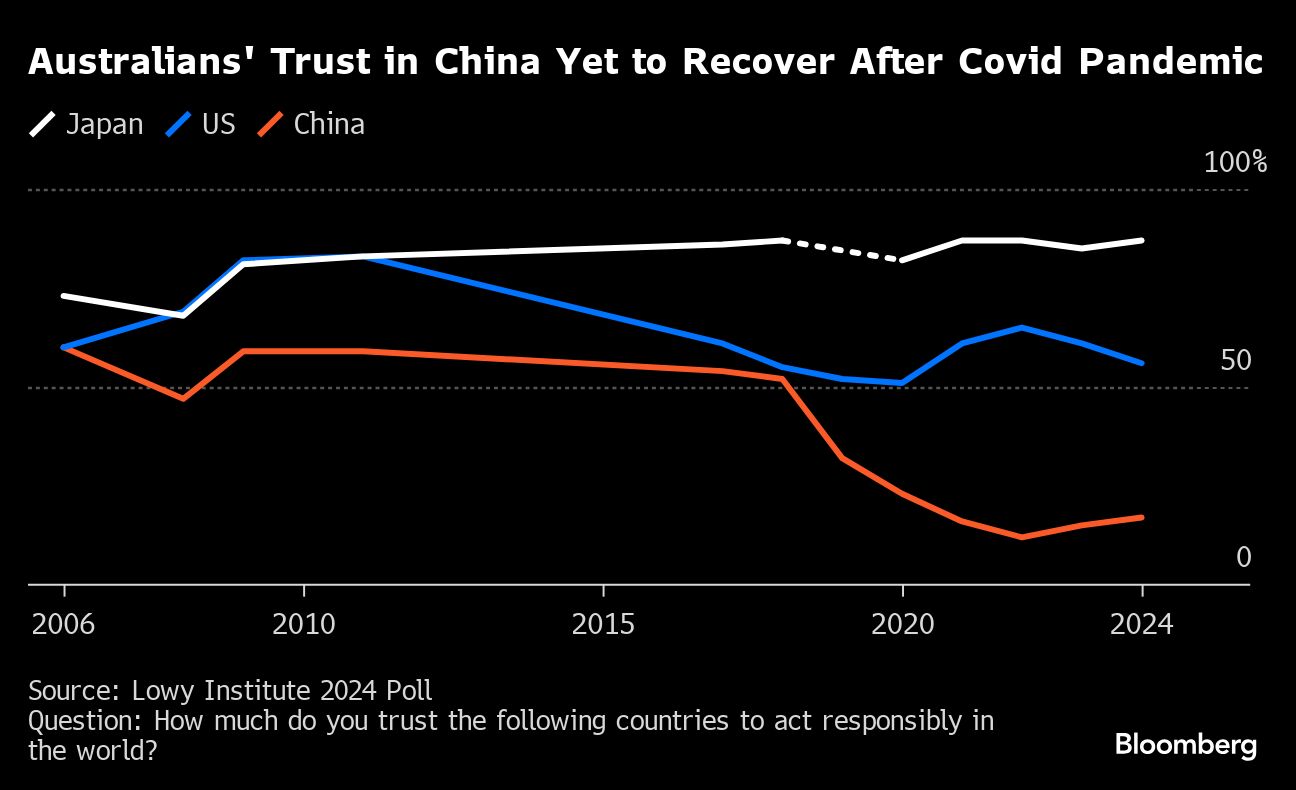
CHINA’S LI TOURS AUSTRALIA AS VISIT’S SYMBOLISM MASKS TENSIONS
(Bloomberg) -- Chinese Premier Li Qiang began the first visit to Australia by a senior Beijing leader since 2017, signaling improved ties between the two nations at a time of escalating security tensions in the Asia-Pacific region.
Li arrived in the southern city of Adelaide on Saturday for the first leg of his trip. He toured the city’s zoo on Sunday morning to visit Australia’s only pair of pandas, Wang Wang and Fu Ni. As part of the trip, Li announced the much loved couple would be returning to China after 15 years, but promised to replace them with a new pair of the iconic animals.
In the afternoon, Li paid a visit to a South Australian winery, a symbolic stop for the premier following China’s lifting of punishing tariffs on local wines earlier this year.
Beijing’s No. 2 official will travel to the national capital, Canberra, for meetings with Prime Minister Anthony Albanese on Monday, before heading to mining powerhouse Western Australia. In Perth, Li is expected to visit a critical minerals project with links to Chinese business.
The premier’s visit caps a rapid warming in relations between Australia and China since the election of Albanese’s center-left Labor government in May 2022. Just two years earlier, a trip by such a senior Chinese official would have been inconceivable, given the near breakdown in relations with Beijing imposing punitive trade measures on Australian goods.
Yet for all the bonhomie of Li’s tour, underlying tensions remain. These include Australia’s increasingly important role in the emerging US-led security architecture in the Indo-Pacific that’s arrayed against Beijing, near-misses between the countries’ militaries and Canberra’s reluctance to let China invest in key industries.
Foreign Minister Penny Wong said Australia would raise all points of difference with Beijing during Li’s visit, including tensions over Taiwan and a suspended death sentence handed down to Australian writer Yang Hengjun in February.
“We will deal with those issues and many other issues where we do have to navigate a set of differences of views between how China operates in this region and the sort of region Australia and many others want to engage in,” she said in an interview Sunday on the Australian Broadcasting Corp.
The current state of relations appears “unsustainable,” said Bec Shrimpton, director of defense strategy and national security at the Australian Strategic Policy Institute.
“The intractable, the long-term, the strategic and the structural issues in the relationship remain,” she said. “They are danced around, they are talked about gingerly, they are talked about merely enough to say they have been talked about.”
In just the past year, Australian and Chinese forces have engaged in standoffs in the Asia-Pacific. In May, Canberra accused a Chinese fighter jet of firing flares near an Australian military helicopter in the Yellow Sea, just six months after a separate incident resulted in the injury of a navy diver.
Former Australian Ambassador to China Ric Smith said while normalization of relations between Canberra and Beijing is a “worthy” aspiration, it remained to be seen whether it was sustainable in the long term.
“It will depend on cleverness on our part,” he said at a Lowy Institute event in Canberra on Friday. “And on how aggressive China chooses to be in relation to this lower level demander, as they see it.”
Smith, who was Australia’s ambassador from 1996 to 2000, said the improvement in relations so far had been a “superficial” normalization. “They’ve got to see, and we’ve got to decide, whether we’re serious about that or not,” he said.
While Albanese and his government have stuck firmly to language geared toward “stabilizing” the relationship with China, Beijing has pushed for closer ties. One particular area of focus for the Chinese government is greater access for their businesspeople to Australia’s critical minerals sector.
China has long had a near-monopoly on supply of refined materials such as lithium, graphite and rare earths, which are vital to high-tech manufacturing and the green energy transition. In recent years, Australia has been working with the US and other partners such as Japan and the European Union to try to diversify critical minerals supply chains.
Allan Trench, a professor at the University of Western Australia, pointed out that struggles over global resources can often produce disastrous results.
“Critical minerals are almost the new oil of this age and oil has been at the center of conflicts over the last 100-plus years,” said Trench, a mineral economist, geophysicist and business management consultant. “We want to avoid a monopoly and conflict developing over critical minerals over the next couple of decades.”
While the Australian government says it welcomes all interest from foreign investors, in practice there appears to be no appetite to greenlight Chinese requests, irritating Beijing. Earlier this month, Treasurer Jim Chalmers ordered a China-linked investor to divest its stake in a rare earths miner.
--With assistance from Paul-Alain Hunt.
(Updates with winery visit in third paragraph.)
More stories like this are available on bloomberg.com
©2024 Bloomberg L.P.
2024-06-15T19:30:27Z dg43tfdfdgfd